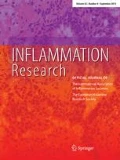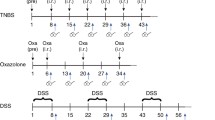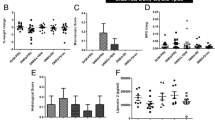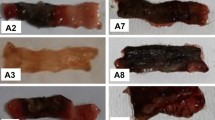Abstract.
Objective and Design: To determine the effect of nicotine on colonic inflammation in the trinitrobenzenesulphonic acid (TNBS) model of inflammatory bowel disease in comparison with sulphasalazine.¶Materials: Male Wistar rats were used for the in-vivo and ex-vivo studies. In-vitro studies were performed using human leukemia peripheral blood monocyte cells (THP-1 cells) grown in continuous culture.¶Treatment: Rats were given access to either nicotine (5 or 100 μg/mL) or sulphasalazine (375 μg/mL) in their drinking water for 10 or 2 days respectively before and 3 days after TNBS administration. THP-1 cells were treated with nicotine (10-14 to 10-11 M) for 2h before and after stimulation with 3 μg/mL lipopolysaccharide (LPS).¶Methods: Inflammation in the TNBS model was assessed by measuring the tissue myeloperoxidase activity, leukotriene B4 concentration, inducible nitric oxide protein expression, the ex-vivo production of tumour necrosis factor α (TNFα), macroscopic damage score, plasma corticosterone levels and by a qualitative histological evolution. The effect of nicotine on TNFα production in LPS stimulated THP-1 monocyte cells in-vitro was also determined. Statistical comparisons were made using the Mann-Whitney U-test for the macroscopic damage score and an ANOVA for all other parameters.¶Results: TNBS treated rats given access to 100 μg/mL nicotine in their drinking water had a marked reduction in several of the markers of inflammation compared to control TNBS treated rats, but a greater reduction was found at 5 μg/mL nicotine or 375 μg/mL sulphasalazine, the latter producing comparable reductions in inflammation to the low dose nicotine. Nicotine also caused a significant reduction in TNFα release from THP-1 cells.¶Conclusions: Nicotine reduced inflammation in the TNBS model of colonic damage confirming the use of nicotine in IBD although the choice of dose requires further investigation. The mechanism of action of nicotine does not involve increased corticosterone levels, but may be a consequence of a reduction in TNFα or leukotriene B4 production.
Similar content being viewed by others
Author information
Authors and Affiliations
Additional information
Received 22 September 1999; returned for revision 17 December 1999; accepted by M.J. Parnham 9 February 2000
Rights and permissions
About this article
Cite this article
Sykes, A., Brampton, C., Klee, S. et al. An investigation into the effect and mechanisms of action of nicotine in inflammatory bowel disease. Inflamm. res. 49, 311–319 (2000). https://doi.org/10.1007/s000110050597
Issue Date:
DOI: https://doi.org/10.1007/s000110050597




